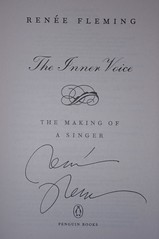This post was originally posted at the Pittsburgh Symphony Orchestra Blogs
The day before the opening Gala, Renee Fleming and Ann Pratchett had a book discussion at the O’Reilly Theater. It was an enjoyable conversation with two artists. They spoke of limits, of family, of talent. But what stood out, was they spoke that creating art is work.
Fleming commented that one thing that she dislikes is the belief that music is a gift, that one day someone opens her mouth and sings, then she is discovered, and then she goes to the Met. (Metropolitan Opera). Ann also has instances where people ask if she works. Because they are faced with the belief that talent is innate, it only needs to be found. But for both of them, this is not true. And it is not true in general.
Peter Orszag recently wrote two pieces in the New York Times about talent and effort. His observation that is shared by many others who have examined this (Michael Syed “Bounce”, Carol Dwed “mindset”, and others is that innate talent only gets so far, that to reach world class levels in a complex field takes practice. 10,000 hours of practice. It holds in music, mathematics, many sports, and chess. It shows in the dedication of young men and women in their teens who get up with the rising sun to practice, whether it is on the athletic field the weight room or in the studio. The students working their way through problems and proofs. My friends in martial arts working on their kata. Soldiers and FBI agents working through battle drills in the desert.
Fleming said at one point that when learning a part, it is not enough to know the words and the music, then you need to learn the meaning. And then, when you know what it means and you know it well, you are able to do more then follow the score and you are able to interpret or try new techniques to make it your own. The same is in other fields. Through practice the athlete learns the limits of her body and strength. The chess or go player can recognize patterns on the board and see the progression of the game. The soldier knows his role on his team and the overall intent of his commander even when he is unable to communicate with them. The mathematician or scientist or engineer can look at a problem and recognize what the form of the solutions or results will be even before she begins the work. Authors and writers can see how a turn of phrase can change the tone of a work. All this comes not from some gift of birth, but time and effort in practice and study, purposeful and directed effort.
The thing is, somehow one has to be convinced this is worth the effort. If you are good, you will be around people who are even better. And you will be working on things beyond your ability. And here you have a choice. You can decide you are good enough and stop. You can give up because it is too hard. Or you can look ahead and decide that it is worth the effort and pain of work to master your art. And the rewards? While Renee Fleming stated that her goal when growing up was to be good at something and it did not have to be music, I am glad that it was.
Subscribe to:
Post Comments (Atom)

No comments:
Post a Comment